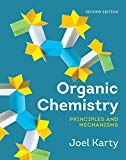
Concept explainers
Interpretation:
It is to be verified that the reaction in Equation 18-27 is a reduction by computing the oxidation state of the carbonyl C atom in the reactant and the corresponding C atom in the product.
Concept introduction:
A species that gains one or more electrons undergoes reduction and becomes reduced. To calculate oxidation state of an atom, in a covalent bond, all the electrons are assigned to the more electronegative atom. If the atoms are the same, divide the electrons equally. Compare the atom’s assigned valence electrons to the
Want to see the full answer?
Check out a sample textbook solution
Chapter 18 Solutions
Organic Chemistry: Principles and Mechanisms (Second Edition)
- Please provide the mechanism and reagents for this reactionarrow_forwardPlease help me in completing the following reactions just like how it was shown in the example below.arrow_forwardPlease provide a complete, detailed curved-arrow mechanism for the following reaction. Include ALL lone pairs and formal charges. Using the mechanism and a few words, explain why the NaOH deprotonates at the a-position and not the b-position or the aldehyde hydrogen. Also, explain why the indicated alkene is formed in the 2nd second rather than the other possible alkene product.arrow_forward
- Provide the major product for the following reaction.arrow_forwardOrganometallic compounds act as nucleophiles under very specific conditions, and can generate alcohols, alkanes, among others. Describe in detail what these reaction conditions are so that organometallics can perform the addition reaction to carbonyl.arrow_forwardModify the structure to represent the organic product, if any, expected from each fo the oxidation reactions. Note that (O) represens an oxidizing agent, such as potassium dichromate, and that (O) is present in excess.arrow_forward
- In the next series of reactions list the products.arrow_forwardComplete the missing structures in Cannizzaro reaction shown below. КОН + Oxidation product Reduction productarrow_forwardSupply the major product obtained from an acid-catalyzed hydration reaction of each of the following alkenes.arrow_forward
- Show the complete synthesis for the following reaction that forms the following product(s) PLEASE INCLUDE STRUCTURE AND REAGENTarrow_forwardWrite a synthesis to convert ethane to the following compound shown below. Note: the synthesis has to be conducted in a basic medium throughout. No acidic conditions allowed.arrow_forwardwrite the major products for each of the following reactionarrow_forward
 Organic Chemistry: A Guided InquiryChemistryISBN:9780618974122Author:Andrei StraumanisPublisher:Cengage Learning
Organic Chemistry: A Guided InquiryChemistryISBN:9780618974122Author:Andrei StraumanisPublisher:Cengage Learning
